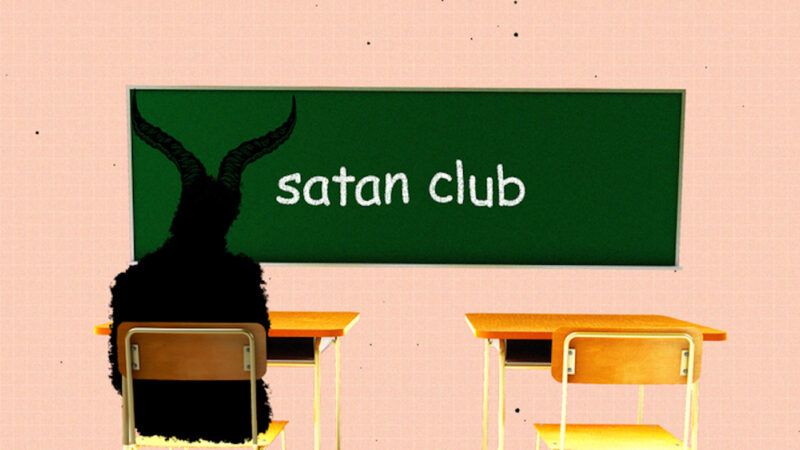Satan Clubs Should Be Allowed in Schools
“After School Satan Clubs” cause no direct harm—they merely challenge the relationship between religious institutions and public schools.

On March 31, the American Civil Liberties Union (ACLU) filed suit against Pennsylvania's Saucon Valley School District after it dismantled the "After School Satan Club," an after-school program sponsored by the Satanic Temple with chapters across the country, allegeding the club failed to communicate that it was not formally sponsored by the district. The ACLU argues that the removal was actually motivated by the hundreds of angry messages the district received from local parents and the general public.
Saucon Valley is not the only American community bedeviled by Satan clubs. Similar clubs in Colorado, Ohio, Virginia, California, and New York have all generated controversy. The primary concern, as one Pennsylvania parent put it, is that "Satan is here to kill and destroy." Other parents have asserted that the United States is "one nation under God" and that to deny Satan a place in public schools is therefore a necessary and prudent measure. The Napa Legal Institute's Frank DeVito even used Satan clubs to justify restoring the pre-World War II tradition of blasphemy laws.
After School Satan Clubs (and most modern Satanists) do not literally worship Satan. Satan clubs espouse "free inquiry and rationalism," and "[do] not believe in introducing religion into public schools and will only open a club if other religious groups are operating on campus." The Satanic Temple openly rejects the supernatural, using Satan's name and image for shock value.
But even if Satan Clubs were actually worshiping Satan, there's little that can (or should) be done about them. A defense of American pluralism requires a defense of, or at least apathy toward, Satanism.
After School Satan Clubs embrace religious competition. Being secular humanists, they have taken on the role that Thomas Paine and the deists played in the late 1790s—they challenge religious orthodoxy and attempt to goad both public and ecclesiastical institutions into responding to them. This role was also played by the transcendentalists of the mid-19th century and the radical atheists of the 1920s. If public institutions respond to their challenges with the force of law, the Satanists will rightly cry foul.
When Satan clubs are banned or otherwise restricted, communities give the clubs' organizers exactly what they want—a framework for removing all religious organizations and institutions from public schools. In 2004, the Supreme Court ruled in Good News Club vs. Milford Central School that public schools, acting as a "limited public forum[s]" outside of school hours, cannot discriminate on the basis of religion.
Religion, in this context, applies not only to belief, but to non-belief as well. The Supreme Court has repeatedly treated atheism as a religion for legal purposes, meaning that atheists are still protected by the Free Exercise Clause. In other words, public schools can't approve a Christian organization without approving a Satan club too. However, school districts don't have the best track record of pluralism. Instead of allowing controversial student organizations to use school facilities, many districts choose to end all student organizations.
For instance, back in 2011, a school district in Texas chose to shut down all student organizations instead of allowing a Gay-Straight Alliance club. School districts in Georgia and Utah attempted to do the same. Religious groups may suffer a similar fate. Public schools can either be public forums for everyone or they can be forums for no one.
Rather than removing Satan clubs from public schools, some Christians are using alternative, pluralism-friendly methods to respond to Satanists. A collection of churches in eastern Texas hosted a prayer circle in front of a Satanic Temple event. Child Evangelism Fellowship, which operates nearly 3,500 "Good News Club" chapters in schools around the United States, has adopted a nonaggression policy toward after school Satan Clubs—it neither engages nor opposes them. A few parents in California even recanted their opposition toward Satan clubs after finding out the organizations did not literally worship Satan.
In any case, the American pluralist tradition has always left the door open for dissidents and provocateurs, provided that they do not violate any constitutional laws or cause great harm. If we value pluralism at all, we cannot simply throw organizations that merely offend us out of the public square—even if we consider them the personification of evil itself.
After School Satan Clubs cause no direct harm—they merely challenge the relationship between religious (especially Christian) institutions and public schools. Instead of trying to throw Satan clubs off campus, and therefore falling into a legal trap, school districts should leave the Satan clubs alone and defend their right to exist when offended parties demand their removal. The mere mention of Satan should not be enough to cause us to abandon all pluralistic ideals—the devil is in the details.
